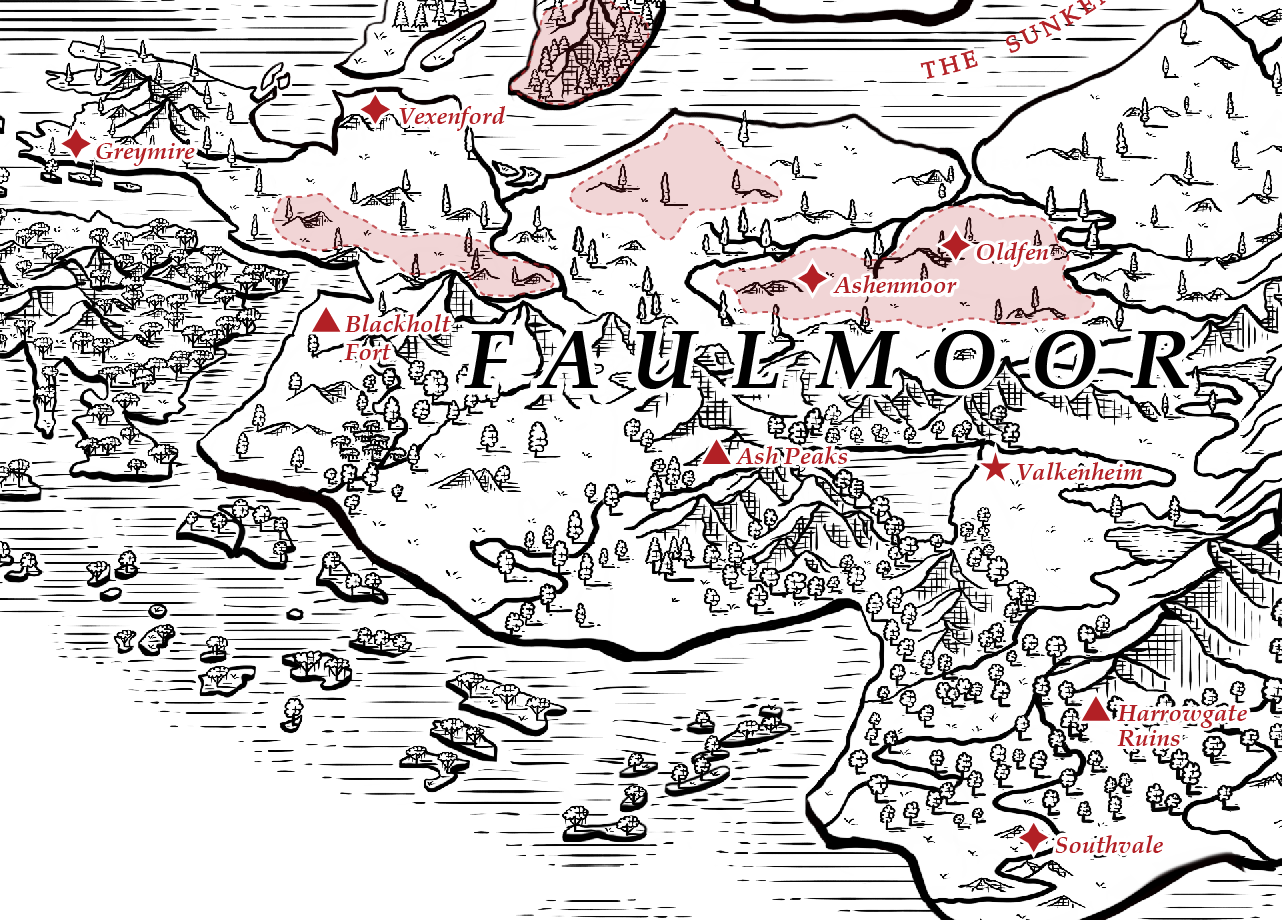The Harrowgate Ruins
The Forgotten Past
Southeast of Valkenheim, where the mountains meet the marsh, the past lies drowned beneath the mire.
The gods do not speak in words, but in echoes of the past. Harrowgate is where their voices still linger, where the faithful may listen. I do not seek riches or relics—I seek understanding. If the old prayers mean anything, then I will find my answer among the ruins.
— Sister Vaelin Dorne, Pilgrim of the Old Ways
The Harrowgate Ruins are an enigmatic and largely buried remnant of the past, located at the foot of the mountains, southeast of Valkenheim. Once a place of unknown significance, the ruins have long since been swallowed by the marshlands, with only a few jagged structures protruding from the mire. What little has been uncovered hints at a much larger ruin beneath the surface, its purpose long forgotten or deliberately erased. Despite its obscurity, Harrowgate has not been forgotten.
To the common folk, Harrowgate is cursed ground. The marshfolk refuse to venture near it, whispering of shifting lights beneath the water, voices that do not belong, and travelers who vanish without a trace. Compasses spin wildly, torches flicker without wind, and those who spend the night near the ruins often wake with memories that are not their own. Yet, not all fear the ruins. Some believe Harrowgate to be a holy site, a place where the voices of the gods still whisper to those who listen. Pilgrims seeking divine guidance travel to Harrowgate, hoping to experience visions, revelations, or signs from the Old Ways. Whether these voices are divine, residual echoes of the past, or something else entirely remains unknown.
Others, less faithful but equally determined, venture into Harrowgate for adventure and discovery. They seek to brave its dangers, map its shifting tunnels, and uncover new secrets hidden beneath the mire. Most return empty-handed and shaken. Some do not return at all.
The ruins that rise above the swamp are few and fractured, little more than blackened stone, half-consumed by moss and reeds. The most notable of these is the Black Arch, a crumbling gateway untouched by decay, always cold to the touch, as if it still remembers something no living soul does. Beneath the surface, submerged tunnels and flooded chambers suggest that Harrowgate was once a fortress, a city, or something far greater before the land collapsed into the swamp. Some scholars believe the marsh itself is unnatural, formed when the ruins sank into the earth, whether by natural disaster, war, or deliberate sealing. Those who attempt to dive into the flooded passages report strange sensations—corridors that seem to shift, glimpses of shadowy figures in the water, and metal structures untouched by rust, their purpose lost to time.
Though no great artifacts of power have been recovered, small relics have surfaced over the years—objects that defy time, logic, or understanding. Among these are a dagger that does not rust, despite centuries buried in the mire, and a strangely light metal plate, weightless yet impossible to dent. A sealed stone container has been found, its carvings untarnished by time, but no one has dared open it. A small orb of polished glass has been recovered, faintly humming when held, though its purpose remains unknown. A ring of interlocking metal bands has been retrieved, which moves slightly when submerged in water. Other relics include the Whispering Coin, a worn silver coin that sometimes murmurs faint voices when flipped, and the Lantern Shard, a fragment of black glass that emits a faint, cold glow in darkness. There is also the Hollow Pendant, a small locket that opens into a void larger than its size, and the Stilled Gear, an intricate clockwork mechanism that vibrates when submerged. The Echoing Clasp is a brooch that, when worn, causes the bearer to hear a distant ringing bell. None of these relics hold immense power, yet each carries a lingering mystery, suggesting that Harrowgate is not merely ruins, but something unfinished, something that still lingers.
Despite its ominous reputation, Harrowgate has never been fully explored. Some believe there is a door beneath the water, sealed and waiting, its presence known only through half-mad stories and strange dreams. Some believe the ruins shift at night, reshaping themselves, their true form only visible in the thickest of fog. Some believe it is still alive in some way, not in body, but in memory, an echo of something that refuses to die. House Valkenmar denies interest in the ruins, but rumors persist that they have sent men into its depths—none have returned.


